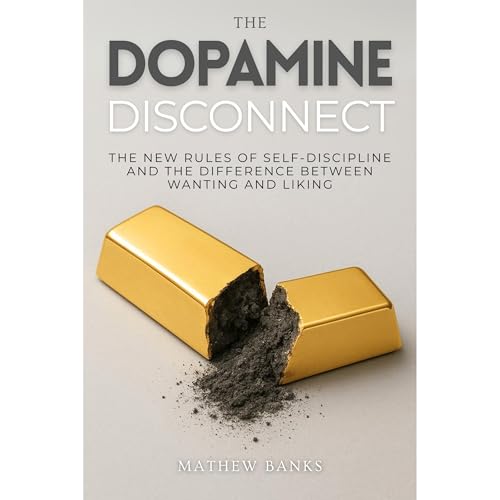
The Dopamine Disconnect
The New Rules of Self-Discipline and The Difference Between Wanting and Liking
No se pudo agregar al carrito
Add to Cart failed.
Error al Agregar a Lista de Deseos.
Error al eliminar de la lista de deseos.
Error al añadir a tu biblioteca
Error al seguir el podcast
Error al dejar de seguir el podcast
Compra ahora por $9.99
-
Narrado por:
-
Virtual Voice
-
De:
-
Mathew Banks

Este título utiliza narración de voz virtual
Discover Why Everything You've Been Told About Dopamine, Motivation, and Self-Discipline Is Wrong
Why do you reach for your phone knowing it will leave you feeling empty? Why does that promotion you worked years to achieve feel hollow within weeks? Why do you buy things you're certain you need, only to watch them gather dust?
The answer isn't weakness or lack of self-discipline. It's the dopamine disconnect—the hidden gap between what your brain makes you want and what actually makes you happy.
Your Brain Is Running Two Completely Separate Systems—And They're at War
Groundbreaking research from the National Institute on Drug Abuse, Stanford, Harvard, and other leading institutions has revealed a shocking truth: dopamine doesn't create pleasure—it creates wanting. The part of your brain that drives you toward goals has nothing to do with the part that actually enjoys achieving them.
Your massive wanting system, powered by dopamine, evolved to ensure survival by creating desire for resources and rewards. Your tiny liking system—consisting of "hedonic hotspots" smaller than grains of rice—generates actual satisfaction and joy. These systems operate independently, and their disconnect explains why:
You can desperately want something you don't actually like
Achievements feel empty moments after reaching them
Addicts chase drugs that no longer bring pleasure
You scroll endlessly through apps that bore you
In the modern world, this disconnect has become a crisis. Technology companies employ armies of neuroscientists to spike your dopamine while delivering minimal satisfaction. The result? You're trapped in cycles of craving that never quite satisfy, wondering why self-discipline feels impossible when the game is rigged against you.
Rewrite the Rules of Self-Discipline Based on How Your Brain Actually Works
This isn't another book telling you to try harder, want less, or develop more willpower. It's about understanding that self-discipline isn't about fighting your dopamine system—it's about recognizing when dopamine is lying to you about what will bring satisfaction.
In this meticulously researched exploration, you'll discover:
Why Dopamine Is Not the "Pleasure Chemical": The Nobel Prize-winning research that overturned everything we thought we knew about motivation and reward. Learn what dopamine actually does (hint: it's about prediction errors, not happiness) and why this changes everything about self-discipline.
The Historical Pattern: From King Midas's curse to Dutch Tulip Mania, from Victorian marriage markets to Silicon Valley manipulation—humans have always struggled with the dopamine disconnect. Learn how Fyodor Dostoevsky gambled away fortunes while hating every moment, why Howard Hughes died miserable despite unlimited wealth, and how P.T. Barnum discovered you don't need to deliver satisfaction if you can spike enough dopamine.
The Modern Amplification: Social media companies use variable reward schedules identical to slot machines. Dating apps weaponize dopamine-driven novelty-seeking. Shopping sites exploit prediction errors. You'll discover exactly how modern technology has weaponized your dopamine system—and why traditional self-discipline advice is useless against Silicon Valley engineering.
Start Understanding Your Divided Mind
The disconnect between wanting and liking shapes every aspect of your life. Understand this disconnect, and you understand yourself.
Las personas que vieron esto también vieron:









